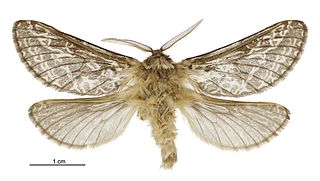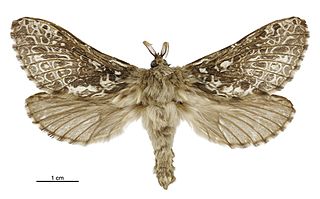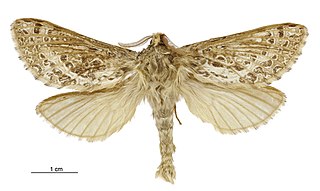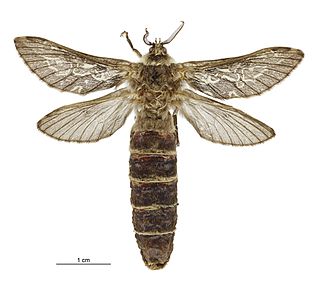
Aoraia is a genus of moths of the family Hepialidae. There are 13 described species, all endemic to New Zealand. The type species of this genus is Porina dinodes Meyrick, 1890. This genus contains some large species with a wingspan of up to 150 mm.

Heloxycanus patricki, also known as the sphagnum porina moth, is a species of moth of the family Hepialidae, the ghost moths. It is the only member of the genus Heloxycanus. This species is endemic to New Zealand. It has been classified as having the status of "At Risk, Declining" by the Department of Conservation.

Aoraia aspina is a species of moth of the family Hepialidae. It was described by John S. Dugdale in 1994 from specimens collected in the Tasman, Otago and Southland districts. It is endemic to New Zealand.

Aoraia aurimaculata is a species of moth of the family Hepialidae. It was described by Alfred Philpott in 1914 from a specimen collected at The Hermitage, Mount Cook by F. S. Oliver. This holotype specimen is now lost. A. aurimaculata is endemic to New Zealand,

Aoraia dinodes is a species of moth of the family Hepialidae. It is endemic to New Zealand. This moth was described by Edward Meyrick in 1890 from specimens collected in Invercargill by Captain Hutton.

Aoraia enysii, also known as the forest ghost moth is a species of moth of the family Hepialidae. It is endemic to New Zealand. This is the only species of the genus Aoraia that can be found in the North as well as the South Island. This species can be found from Mount Te Aroha southwards. This species was described by Arthur Gardiner Butler in 1877 from a specimen obtained in the North Island by J. D. Enys.

Aoraia insularis, also known as the Rakiura ghost moth, is a species of moth of the family Hepialidae. It is endemic to New Zealand and is found on only on Stewart Island and Steward Island's surrounding smaller islands. It was described by John S. Dugdale in 1994.

Aoraia lenis is a species of moth of the family Hepialidae. It is endemic to New Zealand. It was described by John S. Dugdale in 1994.

Aoraia macropis is a species of moth of the family Hepialidae. It is endemic to New Zealand and is found in the mountains of southern Central Otago. It was described by John S. Dugdale in 1994.

Aoraia oreobolae is a species of moth in the family Hepialidae. This species is endemic to New Zealand. It is classified as "At Risk, Naturally Uncommon" by the Department of Conservation.

Aoraia orientalis is a species of moth of the family Hepialidae. It is endemic to New Zealand and is found in eastern Central Otago. It was described by John S. Dugdale in 1994.

Aoraia rufivena, also known as the rufous-veined aoraia or the Otago ghost moth, is a species of moth of the family Hepialidae. It is endemic to New Zealand. A. rufivena was described by John S. Dugdale in 1994.

Aoraia senex is a species of moth of the family Hepialidae. It is endemic to New Zealand, where it is known from the South Island. This species was first described by George Vernon Hudson in 1908 from specimens discovered by J. H. Lewis in Central Otago.

Dioxycanus fusca is a species of moth of the family Hepialidae. It is endemic to New Zealand. This species was first described by Alfred Philpott in 1914 as Porina fusca using specimens collected by C. Fenwick and M. O. Pasco. In 1966 L. J. Dumbleton reviewed New Zealand Hepialinae and placed this species within the genus Dioxycanus, giving it the new combination Dioxycanus fuscus.

Dioxycanus oreas is a species of moth of the family Hepialidae. It is endemic to New Zealand. It was first described by George Vernon Hudson in 1920. The species was discovered by Averil Lysaght.

Dumbletonius characterifer is a species of moth of the family Hepialidae. It is endemic to New Zealand. It was first described by Francis Walker in 1865.

Dumbletonius unimaculatus, also known as the forest ghost moth, is a species of moth of the family Hepialidae. It is endemic to New Zealand. This species is host to the vegetable caterpillar fungus Ophiocordyceps robertsii.

Wiseana cervinata, a porina moth, is a species of moth belonging to the family Hepialidae. It was described by Francis Walker in 1865 and is endemic to New Zealand.

Wiseana copularis is a species of moth belonging to the family Hepialidae. It is endemic to New Zealand. This moth is one of several very similar looking species within the genus Wiseana and this group are collectively referred to as "Porina" moths. In its larvae form this species consumes pasture grasses and, if numerous, is regarded as a pest by New Zealand farmers reliant on good quality pasture for their stock.

Buller's moth is a possibly extinct moth that is endemic to New Zealand. It is known from a single specimen caught in the Ruahine Range by Sir Walter Buller while on an expedition searching for the huia in the summer of 1867. Buller named it Porina mairi in honour of his brother-in-law Captain Gilbert Mair. Buller described the species as having a wingspan of almost 6 inches (150 mm). It is this wingspan that rules out the specimen being associated with species such as Dumbletonius characterifer.



















